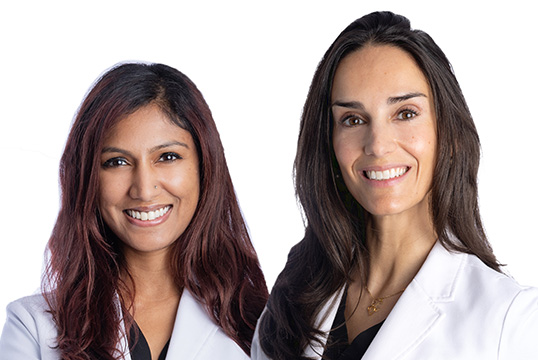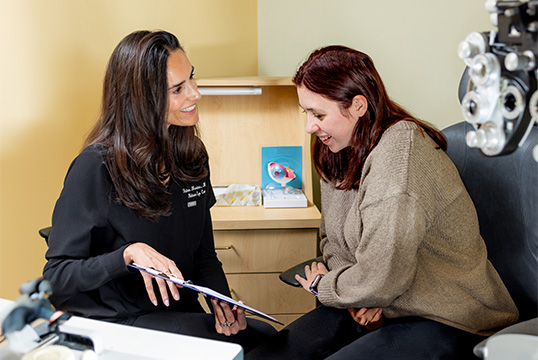Jump to Section
Dry eye is a vision problem that may be much more common than you think! Dry eye can interfere with your day-to-day life, causing symptoms that aren’t always recognizable as your eyes being dry. At Nielsen Eye Center, our expert team can help you achieve relief from dry eye symptoms and enjoy clear, healthy vision.
What is Dry Eye?
The term “dry eye” can be a little confusing since one of the most common symptoms is excessive watering! The key to understanding dry eye is learning that the eye makes two different types of tears.
The first type, called lubricating tears, is produced slowly and steadily throughout the day. Lubricating tears contain a precise balance of mucous, water, oil, nutrient proteins, and antibodies that nourish and protect the front surface of the eye. Normally, lubricating tears are produced day in and day out to keep your eyes healthy and your vision clear. If they’re not produced in enough quantity, your eyes can become dry and irritated.
The second type of tear, called a reflex tear, does not have a similar lubricating value. Reflex tears serve as a kind of emergency response, flooding the eye when it’s suddenly irritated or injured. Reflex tears might occur when you get something in your eye, when you’re cutting onions, when you’re around smoke, or when you accidentally scratch your eye. Reflex tears gush out in such large quantities that the tear drainage system can’t handle them all and they spill out onto your cheek. Another cause of reflex tearing is irritation of the eye from a lack of lubricating tears.
Dry eye is a lack of lubricating tears, meaning that one of the biggest indicators of dry eye is a greater occurrence of reflex tears throughout the day.
Dry Eye Symptoms
Dry eyes can produce symptoms that may not seem like your eyes being dry at all. Some of the most common symptoms of dry eye include:
- Watery eyes
- A feeling of sand or dirt in your eyes
- Itching or burning eyes
- Blurry vision after periods of reading, watching TV, or using a computer
- Red, irritated eyes that produce a mucus discharge
These symptoms can be similar to allergies, leading many people to misdiagnose their symptoms. If you’re experiencing the above symptoms, seeing our expert team can help you get relief.
OUR PROVIDERS
Our team of eye doctors includes some of the foremost experts in laser vision correction and eye surgery in the greater Boston area. We look forward to helping you maintain healthy and clear vision for years to come. Learn more about our leading providers and the high level of service you can expect at the Nielsen Eye Center.
MEET OUR TEAM
What Causes Dry Eye?
Dry eyes are caused by a lack of lubricating tears, but there are underlying factors that can contribute to dry eyes. These include:
- Age: As we get older, the glands in the eyelid produce less oil. Oil keeps tears from evaporating off the eye, keeping them moisturized longer. Decreased oil production allows tears to evaporate too quickly, leaving the eye dry.
- Diseases: Certain health conditions including diabetes, Sjogren’s, and Parkinson’s can cause dry eye.
- Hormonal changes: Changes in hormone levels, especially after menopause, can reduce the amount of lubricating tears produced.
- Prescription medications: These include some high blood pressure medications, antihistamines, diuretics, antidepressants, anti-anxiety pills, sleeping pills, and pain medications. Over-the-counter medications including some cold and allergy products, motion sickness remedies, and sleep aids can also cause dry eye.
- Environment: Hot, dry, or windy conditions, as well as high altitude, air-conditioning, and smoke can also cause dry eye.
- Eye strain: Reading, using a computer, or watching TV for long periods where your eyes must focus can make you less likely to blink and thus less likely to produce lubricating tears.
- Contact lenses: Contacts can dry out the eyes by blocking the amount of oxygen that reaches the eyes, prompting them to create lubricating tears.
- Eye surgery: Some types of eye surgery, including LASIK, can aggravate dry eye.
- Inflammation: Recent research suggests that dry eye may be caused by inflammation due to lower levels of vitamin A found in omega-3 fatty acids.
Featured Videos
Video libraryTreatments for Dry Eye
Getting relief from dry eye begins with meeting with our expert team here at Nielsen Eye Center. During a consultation, we can help you determine possible causes of dry eye and explore treatment options.
Artificial Tears
The most common treatment for dry eye is the use of artificial teardrops that help make up for the lack of natural lubricating tears. Artificial tear products come in liquid form, longer-lasting gel form, and long-lasting ointment form, which is most often recommended for nighttime use. Many different brands of artificial tears are available over the counter. Some contain preservatives and some do not. Unpreserved tears may be recommended for people whose eyes are sensitive to preservatives. Artificial tears can generally be used as often as needed, from a few times per day to every few minutes. Our team will help you understand the best way to use artificial tears for your needs.
Medications
Medications such as Restasis or Xiidra, twice-daily drop therapy, are making strides in helping patients with dry eyes. These options boost the body’s ability to make natural lubricating tears to reduce symptoms. They can also reduce inflammation in the tear glands contributing to a reduced ability to produce tears.
Lifestyle Changes
When infection, inflammation of the eyelids, or clogged oil glands contribute to dry eye, special lid-cleaning techniques or antibiotics may be recommended. It may also help to avoid hot, dry, or windy environments – or to humidify the air in your home or office. Gently cleaning and compressing the tear glands can also keep natural oils flowing to better lubricate the eyes.
Punctal Occlusion
Punctal occlusion with punctal plugs is a treatment for dry eyes that enables your eyes to make better use of the lubricating tears they do produce – and for a longer period. It works by inserting small plug devices into the glands in the eyes to prevent lubricating tears from draining away, keeping the eyes moist.
Managing Dry Eye
With the help of our expert team, you can manage your dry eye and get relief for the long term. Here are a few ways to manage dry eyes and prevent symptoms:
- Avoid irritants like smoke, wind, dry environments, or air-conditioning
- Wear wraparound sunglasses when outside
- Drink about 8-10 glasses of water per day
- Get 7-8 hours of sleep every night
- Limit screen time and take a break to rest your eyes and blink every 20 minutes
- Visit our expert team for treatment

Request a Dry Eye Consultation
At Nielsen Eye Center, our expert team can help you manage dry eye and achieve relief, keeping your vision healthy and clear. To schedule an appointment, contact our Quincy, MA office by calling or filling out our online form.
LASIK SELF-TEST
CATARACT SELF-TEST
DISCOVER OUR CONVENIENT
LOCATIONS NEAR BOSTON, MA
Schedule your appointment today at one of our four convenient offices situated on the South Shore. Serving the greater Boston area, our locations in Quincy, Weymouth, Norwell, and Norwood are here to provide exceptional eye care tailored to your needs.







